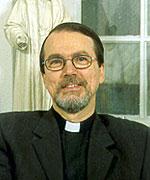
Lutheran Bishop, Finland
|
I am a bishop of a Lutheran Church. According to the Lutheran tradition I am married. I have a spouse, children and grandchildren. They have been a great blessing and joy to me. I know that not all people can have a family. Still, I could not imagine life without my family.
According to the Lutheran understanding, family is the order of creation set by God (Schöpfungsordnung). Martin Luther notes that God first created the church, then the family and only then the society. This order tells us how much our church values the family. The family came before the society. The family is the foundation of the society and the wellbeing of the family guarantees also the wellbeing of the society.
Martin Luther had a great sense of humour. When he describes creation, he uses playful expressions. According to Luther, in paradise people were drunk of God. God wanted to get Adam and Eve to be sober again and that is why he created the church. Church exists that people would live their daily lives soberly and with virtue. The second step in becoming sober is the family. To Luther, family was an entity that includes the marriage and relatives. The tasks of the family include raising children, education and economic activities. To Luther, family was a wide concept and family laid the foundation for people's wellbeing. The third step in becoming sober is the society. In Luther's time, society had few tasks. Society and its broad selection of tasks did not yet exist in the 16th century. The family did many things that later have been given to the society.
According to the Lutheran Church, the family is both a divine and worldly order. The family is guided by faith and reason. The Church guides the family with the word of God. At the same time the family is guided and regulated also by worldly legislation and the results of modern science. The church thinks that reason and scientific research have created the prerequisites for continuous interpretation of family in the reforming society.
According to the Lutheran view, family is the basis of the society and the entire world, because the family was created before the society. However, in the western world, the family is living in a deep crisis. In Finland, nearly half of the marriages end in divorce. The families are under tremendous pressures. Working life demands comprehensive efforts of the spouses. People bring their work duties home. The computer is turned on in the evening after the children have gone to bed and work continues into the early morning hours. People get exhausted and no longer have the energy to love each other. Also the increasing desire to accumulate wealth and economic wellbeing for the family ultimately turns against the family.
The future of the society is at risk because the family is suffering. What can we do for the families?
Martin Luther underlined the significance of raising children. Because of this, our church has greatly contributed to raising children. According to the view of Luther, the Church's duty is to give values and content to raising children. In line with this, our church raises and educates children, youth and families. A large part of the children in our country are in some way involved with the Church's education work. More than 80% of the youth in our country attend the confirmation school of our church. There is a lot of youth work done in the parishes. We believe that we are creating the foundation of the future of the family by giving the children and youth enduring values.
Another important issue is advocacy for the families. The bishops of our church are continuously in contact with politicians and decision-makers to enhance the position and prerequisites of the family through legislation. We are especially speaking for the families that have been marginalised. In the 1990s, there was a deep recession in our country resulting in great many homes and families, in which poverty goes from one generation to the next. The Church aims to influence particularly the position of these families.
The third important thing is to act for the benefit of the families. We do not just talk but seek concrete action. Our church has organised couples training for those intending to marry. People get training for various professions and tasks. But young people step into marriage without skills as couple and merely based on romance. No wonder then that marriages are short-lived. Our church tries to improve couples skills by organising marriage schools. They have been very popular. Those who want to get in are too many for us to take.
We are also trying to help the families in crisis by organising therapy for them. In nearly every big parish there is a family affairs negotiation centre, in which a pastor or other church worker with therapy training discusses with the couple in crisis sometimes for long periods of time. In this way we have saved marriages and helped them to a new beginning.
Dear friends! According to Martin Luther, the family is the church's garden. We all know that gardens must be tended. When the summer is dry, we need to water the plants, when there is rain, we must protect them. The weeds must be pulled out and at times it is good to add fertilisers. We are responsible for the future of families and of humanity. We cannot just sit and grieve because the families are doing badly. We can do a lot to benefit them. |

